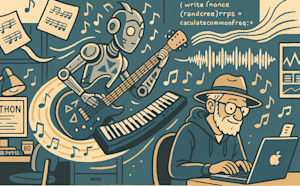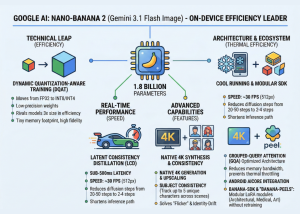Generative AI isn’t coming for you — your reluctance to adopt it is

Join our daily and weekly newsletters for the latest updates and exclusive content on industry-leading AI coverage. Learn More
I’m a writer and always have been. My writing skills are undeniably central to my career as an in-house public relations leader and communications strategist. Admittedly, I scoffed at the notion of generative AI coming for my job. How could a soulless machine match my creative prowess? Eventually, I realized the threat to my career did not come from AI, but from my reluctance to adopt it.
Like many, I’ve been working for AI companies for years. I’ve worked with dozens of AI-based applications, long before OpenAI’s launch of ChatGPT in November 2022 sent the world into a frenzy of fear and excitement.
Recently, at a marketing all-hands meeting, we were asked how often we use gen AI in our work. Everyone replied they were using it literally every day — except for me. There are times when you want to stand out in a crowd. This was not one of them. I suddenly felt like that uncle who still refuses to get a smartphone.
Letting go of pretentious skepticism
I approached my first conscious encounter with a large language model (LLM) with a mixture of condescension and fear. Surely, no machine could replicate my professional wit and the tailored nuance of my prose, meticulously crafted and fit for purpose. It was an affront to my expertise and my pride to think I needed help from anyone or anything to do my best work. I also didn’t want to be seen as cutting corners.
Was using AI like cheating?
I quickly thought back to the impact of my writing on the trajectory of my life. Would I have gotten into Cornell if everyone was using AI to craft brilliant college essays? Has one of my greatest professional strengths now been democratized, chopped up into little easily accessible pieces and distributed to the masses? It felt like a talent I’ve cultivated for years was now everyone’s to tap into with just one click.
Existential dread popped in and out of my head. Was I a 2007 iPod?
Why was I so resistant to accepting AI into my work? It doesn’t take AI to figure out where my fear was coming from — a misconception that AI would replace me or, worse, make me average, rather than better. I saw AI-driven writing as a personal sleight, a harbinger signaling the redundancy of my craft. I was too afraid of the risk to my career to imagine the benefits.
Falling for the enemy
Faced with a growing to-do list and the new balancing act of returning from maternity leave to an expanded role leading public relations for a publicly-traded tech company, I opened Jasper AI.
I admittedly smirked at some of the functionality. Changing the tone? Is this AI emotionally intelligent? Maybe more so than some former colleagues. I began on a blank screen. I started writing a few lines and asked the AI to complete the piece for me. I reveled in the schadenfreude of its failure.
It summarized what I had written at the top of the document and just spit it out below. Ha! I had proven my superiority. I went back into my cave, denying myself and my organization the benefits of this transformative technology.
The next time I used gen AI, something in me changed. I realized how much prompting matters. You can’t just type a few initial sentences and expect the AI to understand what you want. It still can’t read our minds (I think). But there are dozens of templates that the AI understands. For PR professionals, there are templates for press releases, media pitches, crisis communications statements, press kits and more. And there are countless tools to discover. Prompting can be the difference between AI improving your writing and wasting a lot of time.
Models today can write coherent narratives, accurately use industry jargon, match tone and mirror any writing style. I would never copy and paste its work directly, because AI can infringe copyrights and hallucinate falsehoods, but it provides a great starting point and often conquers the initial “blank-page” battle of just sitting down and starting to write. Even just prompting the AI correctly forces you to bake out a decent outline, which is a great place to start for most writing projects. The impact on my time management and productivity was striking.
Using gen AI felt like I had the antidote to writer’s block.
I had found a first mate on my PR team who never takes days off.
Raising the bar
Gen AI capabilities are making their way into countless business applications beyond writing-intensive professional domains like mine — and for good reason. Here’s my advice on making peace with these technologies:
No matter what you do for a living, stop swimming against the current. It will pull you under and take your career down with you. You need to ride this wave and master it.
Generative AI is not going to be your competitive advantage. Instead, it will likely raise the bar for everyone, moving the goalpost for your accomplishments whether you like it or not.
Don’t just regurgitate AI content. It’s obvious, detectable and doesn’t provide any value. Instead, thoughtfully harness gen AI to make what you’re already doing better, faster.
We don’t know how we’ll be using gen AI five years from now (or even next year), but rest assured, almost everyone reading this will be using it — whether they know it or not. AI will be integrated in holistic, human-centric and seamless ways across the apps we use at work and in daily life, as a vital part of systems we don’t see but that shapes our interactions.
As with so many things in life, adaptability and willingness to embrace change are the keys to staying relevant. Humans are resilient. AI isn’t coming for us. It’s coming for our inefficiencies. Grab these tools with both hands and make them work for you.
Melanie Holly Pasch is head of public relations at WalkMe.
DataDecisionMakers
Welcome to the VentureBeat community!
DataDecisionMakers is where experts, including the technical people doing data work, can share data-related insights and innovation.
If you want to read about cutting-edge ideas and up-to-date information, best practices, and the future of data and data tech, join us at DataDecisionMakers.
You might even consider contributing an article of your own!
Read More From DataDecisionMakers












